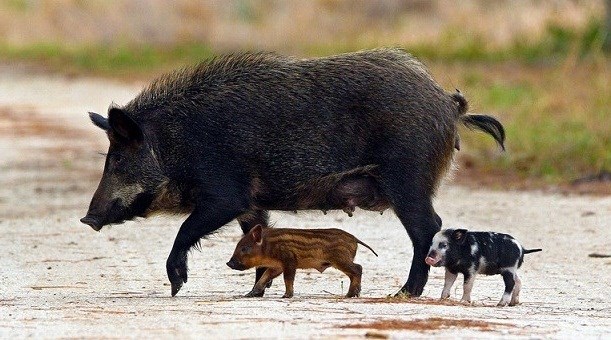
NPS Photo Feral Hogs on the Buffalo Wild or feral hogs are not native to Arkansas and the Buffalo National River. They have become established due to inadvertent or illegal release and high reproductive success. Feral hogs compete directly with many native animals for food and destroy habitat for many wildlife species. They can pose threats to humans, pets, and domestic livestock through the spread of disease, such as swine brucellosis, pseudo rabies, and trichinosis. Feral hogs root and wallow in the ground searching for food, causing soil erosion, which in turn affects water quality. They destroy sensitive natural areas within the Buffalo National River such as glades, marshes, and springs. Feral hogs feed most heavily at dawn and dusk, spending the majority of the day either wallowing in mud holes or resting in dense vegetation. The National Park Service has been working with the Arkansas Game & Fish Commission and the U. S. Department of Agriculture Animal & Plant Health Inspection Service in an effort to reduce the feral hog population in the state and on the Buffalo National River. Hunting and trapping methods are currently being used by the National Park Service as means to reduce the population of feral hogs on the park Buffalo National River and the Arkansas Game and Fish Commission recognizes large-scale trapping as the most efficient and economical means currently available to reduce feral hog populations. Sport hunting of feral hogs has been more hindrance to hog removal than benefit. Illegal relocation of hogs for hunting purposes has spread the problem to new areas. The shooting of individual hogs also thwarts large-scale trapping efforts by agencies because increased disturbance makes it nearly impossible to catch the whole sounder, or family group, at once. |
Last updated: April 10, 2015
